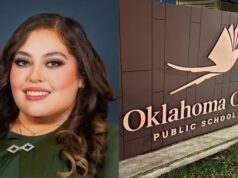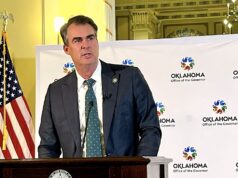

In an election year when education has been many people’s primary focus, the three candidates for Oklahoma state superintendent of public instruction talked to NonDoc about their visions for the future.
Incumbent Republican Joy Hofmeister is seeking her second term as superintendent. Prior to her 2014 election, Hofmeister was a small-business owner, served as an officer with the Jenks public school foundation and was appointed to the state board of education in 2012.
“The work is not finished,” Hofmeister said. “We want to finish the work to allow our students to be more competitive in student outcomes. But it’s going to take facing the facts of what resources have been eroded that need to be restored.”
Democrat John Cox ran for state superintendent four years ago, losing with 44 percent of the vote to Hofmeister. Cox holds a doctorate in educational administration from Oklahoma State University. Per his website, he has spent 32 years in Oklahoma public schools and and served for 24 years as the superintendent in Peggs, Oklahoma.
He remarked on differences between the superintendent’s race four years go and the 2018 race.
“Back four years ago when I was going to meetings, there might be 10 people there,” Cox said. “When I’m going to meetings now, there are 20, 30, 50 people. More people are engaged. Not just teachers, but business people and parents.”
Independent candidate Larry Huff has worked for 30 years with the Oklahoma State Department of Education as a special education administrator. He has also worked as a school accreditation officer and has taught education courses at Oklahoma City University, East Central Oklahoma State University and Southwestern Oklahoma State University.
“I’m not so sure that a person elected as state superintendent should be elected as a Republican or a Democrat,” Huff said. “We don’t ask kids when they come to school if they’re a Republican or a Democrat.”
Challengers cast doubts on incumbent
In his interview, Huff questioned on Hofmeister’s credentials to be superintendent.
“I think it’s counterproductive to have someone as state superintendent of public schools that’s never taught in the schools in Oklahoma,” Huff said.
Likewise, Cox looked to cast doubt on Hofmeister’s credentials as well. He said the 2014 superintendent’s race was more about party than qualifications.
“What people were saying was, ‘Why do we have someone who’s not an educator in that position?'” Cox said. “It was really Democrat versus Republican. Nobody really looked at what our qualifications were.”
For her part, Hofmeister urged voters to consider her experience as superintendent.
“I’m the only one who’s done the job and delivered on every promise and priority we’ve set,” she said. “I won’t stop until all Oklahoma students have a well-rounded, high-quality public education.”
Candidates express concerns over funding
Despite the 2018 passage of a historic revenue package that ensured teacher raises and other funding increases, all three candidates said the Legislature appropriating more money to education is a priority.
“I believe the most pressing issue is long-term budgeting stability,” Hofmeister said. “We can’t focus on education once every 10 years and expect to increase student achievement and keep teacher pay at a competitive level.”
Hofmeister said her experience in the office will help her work with the Legislature to find long-term budgeting solutions.
“I will work with the Legislature to implement a funding process that will make public education a priority every single year,” she said. “Public education must be more of a priority so the Legislature doesn’t govern by crisis.”
“We need more money,” Huff said. “My job as state superintendent would be to articulate to the Legislature what the needs of the students are in the state of Oklahoma.”
Huff emphasized that it’s the Legislature’s job to find money for schools.
“I resent them telling the teachers, ‘Well, you tell us where to get the money’,” he said. “Because what that does, if I go out there and say we need to tax the oil industry or the wind industry, then they’re going to turn it around on me.”
Cox set goals for teacher pay over the next two years.
“We have to get the minimum (teacher pay) to 40 (thousand dollars),” Cox said. “What my push will be is to get $2,000 next year, which is $120 million, and then $2,000 the following year. And that will push the first-year, entry-level teacher up to $40,000.”
Cox was optimistic about his goal and talked about revenue streams Oklahoma has lost in recent years.
“That’s something that’s doable,” he said. “We have cut income tax from 7 to 5 percent over these past 10 years. And that was almost $1.5 billion we took out of the revenue stream, so no wonder we don’t have money right now. I don’t like taxes, but I believe in core services and I believe in taking care of the people of Oklahoma.”
State Question 801 would affect education funding
In brief, SQ 801 would amend the state constitution to allow school districts greater agency in how they use property tax dollars previously earmarked for school building funds. The question would remove restrictions so schools could use that money for teacher salaries, school supplies or other education expenses.
Huff said he opposes SQ 801.
“Because of the lack of appropriations of funds for teachers and so forth we’ve gotten so far behind. The way to get that is exactly the way it’s been, through appropriations,” Huff said. “It’s robbing Peter to pay Paul.”
Cox is also opposed to the question.
“In a lot of our rural schools, I know, but in a lot of our schools we don’t receive much building-fund money,” Cox said. “And so in a lot of our cases, it’s not going to do anything to help us. They want to put the burden on the local district to raise all the money to run their school.”
Hofmeister said the flexibility SQ 801 would offer districts would be good, but that the question would not create new, much-needed resources.
“This is not new money, this is trading money from one pocket to another,” Hofmeister said. “And I am more interested in seeing more funds directly impacting classrooms, not taking money away from infrastructure or away from maintaining of our school house and trading that to another place.”
Backgrounds breed priorities
The three superintendent candidates agree on many issues, yet each has his or her own priorities unique to experience and background.
Cox, a math major, talked at length about his desire to incorporate technology training into high school curricula.
“I think we just lost all focus of where we’re going and we put everyone in a college-ready box,” Cox said. “And over 75 percent of our students do not finish college, so what are we doing for them?”
In specific, Cox talked about allowing students to learn applied mathematics by working at technology centers starting their sophomore year. He said this would give options for non college-bound students, improve job readiness out of high school and keep kids in school.
Huff said he worked with David Boren to secure the first funding for gifted and talented education in Oklahoma. He said a priority of his would be to limit the number of tests students have to take.
“What we’ve done is we’re testing kids crazy. Why? So we can put in the papers how this school rates with this school,” Huff said. “The reason why we should give students tests is for diagnostic purposes to find out what they need. And we plan programs based on those needs.”
Huff said the job facing the next superintendent was enormous, and every aspect of education is going to be examined. He doubted whether anyone would be able to fix Oklahoma’s education system as quickly as it needed to be done.
Hofmeister said she would like to devote more attention to special needs students.
“Teachers need training and coaching as they are working with students who have diverse needs,” she said. “Students who have experienced trauma in their life require unique approaches to ensure that they are ready to learn. And our teachers are asking for that training.”
Hofmeister said the state needs to build and grow momentum in regard to education reform. In addition, she said building and maintaining a teacher pipeline would be vital in combating Oklahoma’s teacher shortage.




















